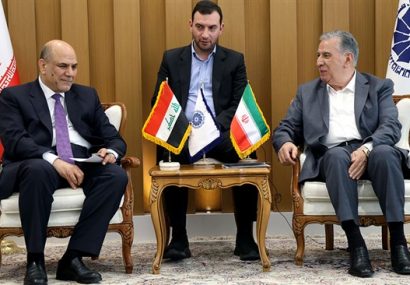Iran, Iraq Explore New Avenues to Boost Bilateral Investment and Trade
TEHRAN (Iran News) The session, which took place on Tuesday, was led by Samad Hassanzadeh, President of the Iran Chamber of Commerce, and Nasir Abdul-Mohsen, Iraq’s Ambassador to Tehran. Discussions centered on resolving legal disputes through arbitration, developing border industrial zones, and boosting overall investment and trade flows between the two nations.
Hassanzadeh opened the meeting by highlighting Iran’s capabilities in industries such as engineering services, industrial technology, mining, and infrastructure development. He noted that these sectors provide a solid foundation for deepening collaboration with Iraq.
While acknowledging the strong diplomatic and economic ties, Hassanzadeh expressed dissatisfaction with the current $12 billion annual trade volume, calling it insufficient considering the two countries’ potential. He outlined an ambitious plan to raise this figure to $20 billion through strategic planning and enhanced cooperation.
“Iranian and Iraqi businesses are well-acquainted with each other’s markets, and this mutual understanding is a strong asset for sustainable growth,” Hassanzadeh said. “Iranian entrepreneurs are eager to invest in Iraq, especially in sectors such as food production, agriculture, and healthcare infrastructure. What we need now is active governmental support to issue the required permits and foster smoother collaboration.”
A key proposal brought forward was the creation of joint industrial parks along the Iran-Iraq border. These zones, according to Hassanzadeh, could become export hubs for both countries, supplying goods to neighboring and international markets.
He also stressed the importance of expanding cooperation in tourism—especially medical, social, and religious tourism. Hassanzadeh pointed out that Iran’s well-established medical infrastructure could attract more Iraqi health tourists, and he suggested strengthening educational tourism by welcoming more Iraqi students to Iranian universities.
Other significant topics included the completion of the Khorramshahr-Basra railway project and integration of Iran and Iraq’s electricity grids. Additionally, Iraqi officials were invited to participate in the upcoming Iran Expo 2025, set to be held in May.
Ambassador Abdul-Mohsen praised the depth of Iran-Iraq relations, describing them as a model for regional cooperation. He cited over 1,480 kilometers of shared borders, the presence of 700,000 Iraqis and 120,000 Iraqi students in Iran, and an annual cross-border traffic of 155 million individuals as evidence of deep-rooted social and cultural links.
He estimated the total trade value, including energy, at approximately $18 billion, with Iraq ranking first among nations sending tourists to Iran—many of whom come for healthcare services.
While acknowledging the strength of both nations’ private sectors, Abdul-Mohsen stressed the need to go beyond dialogue and accelerate business exchanges. “Despite strong air connectivity and short distances between our countries, the frequency of visits by business delegations remains low,” he said, calling for more direct interaction between investors.
He noted Iraq’s exports to Iran stand at just $500 million, highlighting an imbalance that favors Iran. The ambassador urged both sides to work toward a more balanced trade relationship and emphasized that joint industrial parks could help shift competitive advantages in favor of Iranian producers in Iraq’s crowded market.
On the topic of health tourism, he acknowledged some existing challenges and called for better regulation and monitoring to prevent abuses. “A more organized approach by Iran in managing health tourism could increase trust and visitor numbers significantly,” he said.
Yahya Al-e Eshaq, head of the Iran-Iraq Joint Chamber of Commerce, also attended the meeting and echoed the push for deeper cooperation. He deemed the $20 billion trade target achievable and highlighted Iraq’s vast $150 billion annual investment potential.
Al-e Eshaq pointed out that Iran offers numerous opportunities, from underutilized production capacity to partnerships in industrial zones. He emphasized that tourism—particularly medical tourism—should be a key area of focus.
However, he also warned that bureaucratic obstacles are stalling progress, despite political support at the highest levels. “We need to streamline regulations on both sides to unlock this potential,” he said.
Addressing another significant barrier, Al-e Eshaq stressed the importance of resolving legal disputes, which often hinder commercial activity. He proposed enhancing arbitration mechanisms and even establishing a bilateral trade union to represent the interests of prominent business figures from both countries.
Aqil Mousavi, Commercial Counselor at the Iraqi Embassy in Tehran, underlined the need for more joint forums featuring economic stakeholders from both nations. He also advocated for the formal establishment of a joint Iraq-Iran Chamber of Commerce to institutionalize cooperation and ensure consistent progress.
As Iran and Iraq navigate a critical phase in their economic relationship, this meeting signaled a renewed political will and private sector enthusiasm to push past long-standing barriers. With practical steps, such as launching industrial parks and harmonizing trade regulations, both sides hope to turn vision into action—ultimately reshaping the region’s economic dynamics.
- source : IRAN NEWS ECONOMIC DESK






























